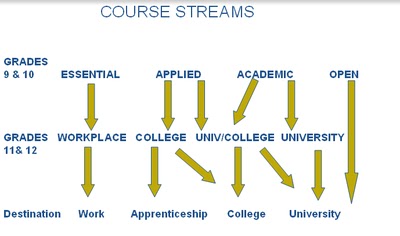Responsibility & Liability
I’m going to try and not sound like a grumpy old man in talking about this.
I had a chat with a friend the other week who is teaching in a private school in the GTA. He had an interesting observation around how students do (and mostly don’t) accept responsibility for their actions. He argued that the libelous nature of the adult world has placed everyone in the position of not being able to own up to honest errors. Rather than being able to apologize and move on, we must instead deny any wrong doing, even when it becomes absurd.
A clear example of this happened in class the other week. Three students were filming, and in the process of setting up the green screen studio they found Nerf guns and began fooling around with them. This resulted in the camera they set up on the tripod getting knocked over and broken; a $400 new camera. The response? “It’s not our fault, we didn’t mean to break it.” These two ideas are tied together in a student’s mind. You can’t be held responsible for your actions if your actions weren’t intentionally about breaking the camera. I tried to explain that it wasn’t ill-intent that led to the camera, it was incompetence, and they are responsible for their incompetence, especially when they willfully engaged in it.
This caused a great deal of confusion. Students don’t feel responsible for their actions unless they are willfully vindictive, and even then, they won’t admit to wrong doing because they never see adults doing it for fear of liability. Because of this poisoned moral environment, students also don’t understand what an accident is and how they can still be complicit in it without ill intent. Fooling around with Nerf guns is not why you were in the studio; your choice to do this led to grievous damage, for which you are responsible.
Slogging through the muddy moral world of our schools can get tiresome quickly. Incompetence cannot be considered a factor in student performance any more. I have a number of students with weeks of absences and we are only just at the half way mark of the semester. Many students will finish this semester in our school with over a month of absences, and they will still be expected to earn a credit. In many cases these absences involve family holidays during classes. Parental competence must also never be called into question either. When those students are in class, they tend to do nothing anyway, but once again, the pressure is on the teacher to ‘find a way’ to ignore incompetence, even if it is simply willful neglect, and pass students. Our idea of success has become one of pass-rates rather than teaching humans how to be responsible people.
What Manners Do For You
In the past week I’ve had a series of senior students walking into the media arts lab and asking to use equipment during class – while the students in the class needed to use it. Whenever possible I try to accommodate these requests; media arts fluency leads to greater technological fluency.
I became less willing to accommodate these requests when the students involved ignored directions, started using student computers without permission and interrupted class to demand more equipment or space. Offering open access to expensive equipment and resources is a nice thing to do, demanding it without so much as a please or thank you won’t get you very far.
This sense of belligerence isn’t unique to this generation of digital natives, though their constant split attention between the world around them and the insinuated cyber-world they also inhabit doesn’t help. Teens have always been known for socially awkward, often rude, behavior; it’s a fun part of their stereotype. The ironic thing is that in my experience this is human nature, not just a teen one. People in general tend toward rudeness, a mannered response is usually a pleasant surprise.
The post modern view of courtesy or manners is one of an anachronistic, inefficient time waster. Just look at our modern success stories (Zuckerberg, Jobs, Gates, Eminem) for an idea of how we value individualized competitiveness, intellectual superiority and financial success as mutually exclusive from polite, collaborative interaction; we love despotism and see the rudeness inherent in it as a strength.
What politeness does is make explicit what is happening between people. When you inconvenience someone by putting your own needs first, you can say things like “excuse me” or “sorry to bother you, but…”, and everyone involved knows that you are aware of the interruption you have caused. When you thank someone for their efforts, you’re acknowledging how they put your interests before their own. Courtesies are focused on verbalizing the necessity of supporting each other in a collaborative manner.
Polite Responsibility
We throw all that out when we start to mix the nasty habits developed around liability law with how we interact with each other. For fear of financial penalty, those students couldn’t simply say the truth: “we’re sorry, we should have known better than to screw around under those circumstances.” They don’t enjoy the release of pent up guilt that comes with apologizing honestly for an unintended outcome. They also haven’t verbalized wrong action and have missed out on the meta-cognitive reinforcement that happens when you describe what you’ve done in honest terms. They carry all that negativity forward.
I was watching soccer yesterday and an obvious handball occurred inside the goalie crease. In my perfect world the offender it happened to would go to the ref and opposing player and say, “yes, it hit my arm. It was a sudden, hard shot and I couldn’t have gotten my arm out of the way in time anyway.” The shooter would then be given the penalty shot and he would have kicked it wide on purpose. Instead, the player stood there stony faced, and said nothing as he knew the rules of the game had been broken, but could not afford the liability of admitting truth.
We do this in our games, our businesses are founded on this concept of non-admittance of wrong doing, and our governments don’t know how to operate any other way. It’s no wonder that we should do it in our schools if we’re going to get our students ready for the adult world waiting for them.
The moral order of operations we need to train our students in to prepare for adulthood:
- It’s best to say nothing than admit wrong doing or incompetence.
- It’s best to lie than to admit wrong doing or incompetence.
- It’s best to accept punishment but still admit to no wrong doing, or incompetence.
- Ignore courtesies, they are a sign of dependence and weakness.



